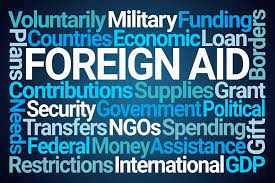By Alusine Fullah
Does Western aid-giving still a useful economic tool? Is it still a useful political tool? Is it ever with no strings attached? For the proponent of aid-giving, aid is a trap for the recipient.
There are two main kinds of aid: public governmental aid and private charity aid. In practice, the two are not completely separate: charities may work with governments, and are subject to government regulation, in both donor and recipient countries. And governmental aid may be given to projects supervised or organised by charities. It seems self-evident that aid, whether from a state or from a charity must make things better for the recipient(s). Aid, after all is aid. For instance, if I have no food today you feed me, I am better off. I am no longer hungry, and perhaps tomorrow I will find work and so be able to feed myself, especially if you can tell me where the likely jobs are to be found.
Modernization theory looks to aid to assist with the modernizing of underdeveloped countries. It is through aid from wealthier states that new projects can be developed and old ones maintained; that work can be created for people; and that the effects of natural disasters, such as drought, can be alleviated. Also, it is through aid that the recipient countries will become able to catch up to the donors in technology and standard of living.
It would seem on the face of it, then, that aid is an altogether good thing, at least from the standard point of the recipient. Why then do we find criticisms of many aid programs and suspicion about the motives of many donors? Let me begin by considering how and why I think that aid is generally, a good thing.
I have already considered why aid might be beneficial to countries that receive it. What about the donors? Aid is a cost to the donor nations and has to be justified to taxpayers by the governments that give it.
Development aid: what is it good for? Well, according to much research the answer may well be absolutely nothing. In fact, it may well be worse than nothing. When judged against its aim of ‘instigating economic development and alleviating poverty’, its record is so dismal it looks as though aid actually hinders the achievement of its own stated goals. And the curious thing is this seems to be something of an open secret. Even to an untrained eye the big numbers pertaining to development aid don’t look right. Take Africa, for example. Over $1 trillion dollars has been pumped into the continent in the last 50 years, and how much has it benefited? How many African countries are actually in a better condition now than they were before receiving aid?
In the words of Economist, Dambisa Moyo, the answer is zero: African people ‘are worse off; much worse off… aid has helped make the poor poorer, and growth slower’. A strong condemnation this may be, but Moyo’s assessment is no outlier. Development expert, William Easterly, has drawn similar conclusions – his study ‘Can Foreign Aid Buy Growth’ revealing an inverse correlation between aid and per capita growth.
To sum it up, after all the analysis above, I confidently stand on the ground that aid is not working. From the disingenuous motivation behind its provision, to the unintended and disruptive knock-on effects of its delivery, at every stage there exist problems. If the Western world is sincere in its desire to help end poverty, it needs to put self-interest to one side, return to the drawing board, and consider the possibility that its participation in development – as it’s currently conducted – might actually be unhelpful. Many of Africa’s biggest advances in recent years, like the widespread adoption of mobile phones, have come from within. And as Deaton has long questioned: ‘who put us in charge anyway?’










